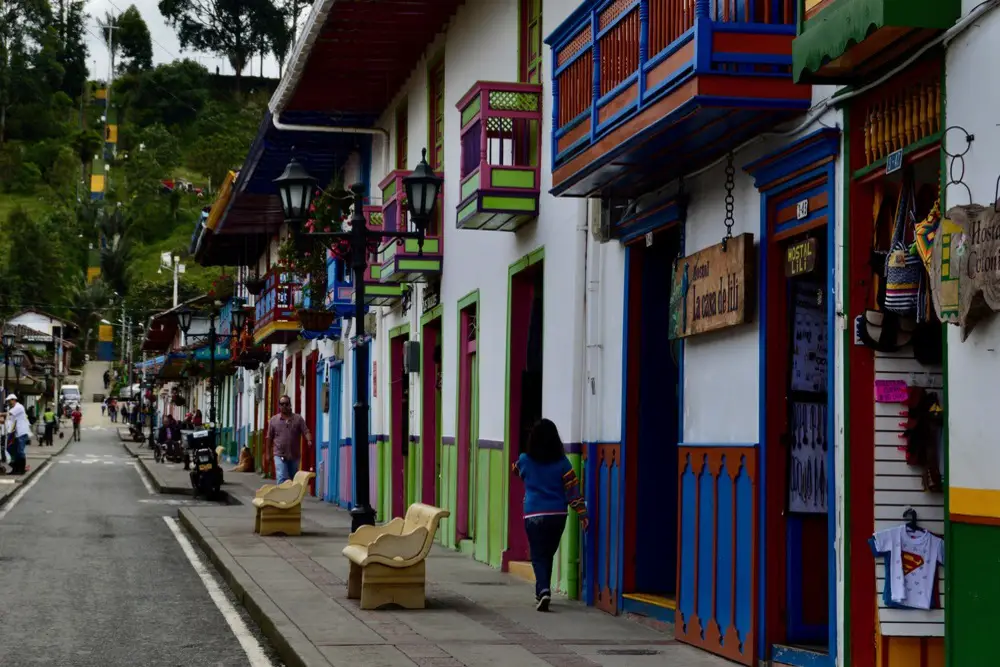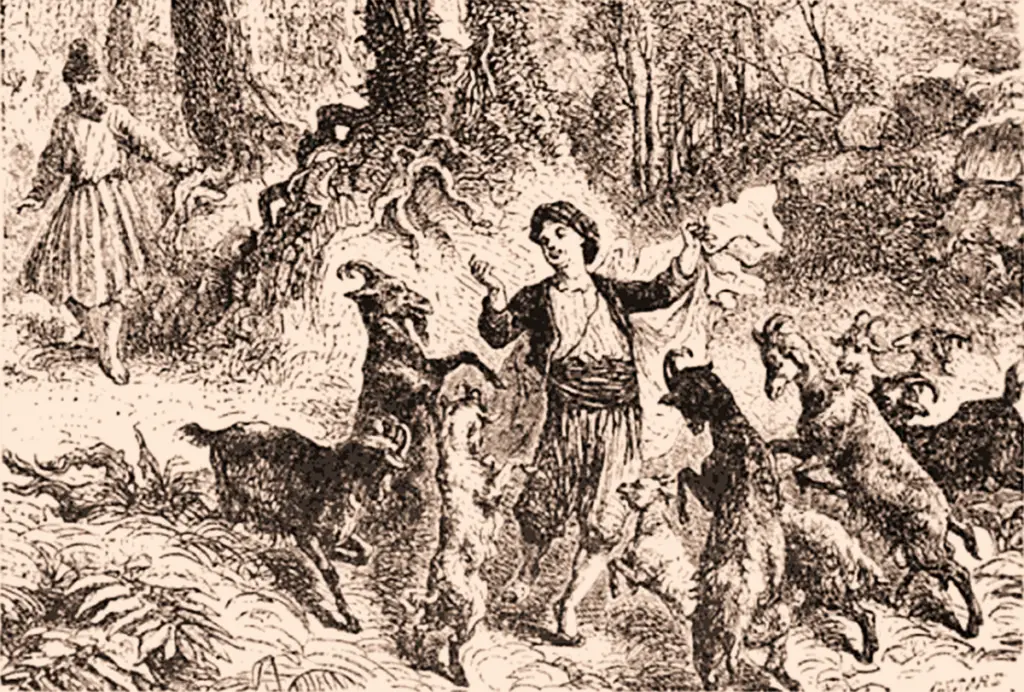The importance of coffee goes well beyond its taste, as it is already a symbol of energy and well-being for billions of people around the world.
Table of Contents
Legends about coffee
Coffee arouses so many passions that there have long been legends and myths trying to explain its origins.
On the other hand, there are also stories about the effects of this drink on those who consume it.
The legend of Kaldi and the dancing goats
This is by far the most popular story about coffee and dates back to Ethiopia around 850 AD.
So, tells this story of Kaldi the goatherd who discovered his herd eating bright red berries from an unknown tree.
As Kaldi approached the goats, he witnessed something extremely odd and strange, for the rare fruit of this tree had transformed the otherwise tranquil herd into lively, dancing creatures.
Thanks for the second chance
Curious about what his eyes saw, the young shepherd took the berries to a local monastery, where the monks began brewing the first batch of coffee, which, by the way, didn’t turn out well.
It is even said that the monks used the branches of the tree along with the berries to brew the brew, so the taste was far from pleasant.
So the frustrated monks threw everything on the fire, but before long they smelled the classic delicious smell of roasted coffee and decided to give the beans a second chance.
This taught them that they had to roast the beans before they could make the drink.
In addition, the monks found that consuming these mysterious berries kept them awake, especially during times of long prayer.
This led to word of this highly acclaimed stimulant spreading to other parts of the world, leading to the global phenomenon that continues to this day.
It should also be mentioned that the largest coffee chain in Ethiopia is called Kaldi’s, in honor of the shepherd to whom we all devout coffee lovers owe so much.
Coffee helped Mohammed
Islam’s most famous prophet had his own encounter with coffee.
Thus, the legend tells that Mohammed was visited by the archangel Gabriel, who gave him a mysterious potion that gave him the strength to continue his journey.
Thus, at the end of the journey, the Prophet of Islam was able to kill 40 of his enemies before capturing 40 virgin women.
Some even say that the Prophet only needed a sip of coffee to achieve victory.
In any case, the fact remains that coffee is still consumed to this day throughout most of the Arab world and is closely associated with Muhammad.
It is therefore used on special occasions, such as B. birthdays served.
The story of Omar the healer
It is said that many years ago in the city of Mocha in Yemen there was a man named Omar who worked as a healer and healed the sick through meditation and prayer.
It is said that his skills angered both the ruler of the country and the head of the Islamic authorities.
Because of this, his enemies spread rumors about him in the community.
Soon Omar was banished and forced to leave the city and move to the desert outside of the city.
So, the man found shelter in a cave, but he was starving until one day he saw a small bush full of red berries.
The importance of roasting
Taking this plant as a sign from God to save him, Omar picked some of the berries and ate them immediately.
He then decided to light a fire to roast the fruit and put them in hot water; the result was that the grains were still difficult to eat, so he drank the liquid to at least quench his thirst.
At first, he didn’t feel much, but he quickly found that he felt awake and energetic even though he hadn’t eaten.
Soon the sick people of the town came to visit Omar in the cave, since they already knew about his abilities as a healer.
Omar then started giving them some of the drink he had prepared as medicine and apparently some of them were cured.
News of the “miracle medicine” quickly spread across the country, and many believed the man’s survival to be a miracle.
In return, the ruler asked Omar to return to Moca and the religious authorities declared him a saint.
Some say that the plant and the black drink were named “mocha” in honor of this event.
Alternative version
Another version of this legend tells that Omar and his mentor were on a pilgrimage to Mecca.
The journey was very difficult, so his master fell ill. Before the latter died, he told him that after his death he would return as a ghost and that he (Omar) should obey him in everything he then told him.
The story goes that the ghost did indeed appear before Omar’s terrified eyes the next night and made a fountain gush from which he was told to fill his bowl (water bottle) and continue on his way.
The ghost also told him to watch out and stop where the water started to gush because important things were going to happen there.
Omar continued walking until he reached the town of Moca, where he observed that the water was turbulent. At the same time, he saw that the townspeople were suffering from a strange and deadly disease.
It is said that Omar offered the water he had to several people and began praying for them; in a short time, they were healed, and he was declared a holy man.
Omar’s mistake
Omar’s fame was such that one day he was summoned to the palace to heal the king’s daughter, who was very ill.
Omar came to the palace and healed the princess, but Omar was so obsessed with her that he wanted to kidnap her and take her with him.
The king learned of the man’s intentions and banished him to the desert.
There was only a small cave where he could shelter from the elements; when he went in there were only some tasteless herbs that he had to use as food.
It stayed like that for a few days, until one morning Omar discovered a strange shrub with white flowers and a dark red fruit.
The man decided to try them and found them so delicious that he only ate them from then on.
Do you know which tree it was? That’s right, legend has it that it was a coffee tree, from the fruit of which Omar was able to make a drink that helped him survive in the desert.
In addition, Omar seemed to have realized that his drink could cure diseases, so one day he decided to return to the city and show the king the effects of the preparation.
The king was amazed and allowed Omar to return to the city and as a reward for his discovery he presented him with a beautiful palace.
So, the news of the miracle potion spread everywhere.
Tears of a god
The Oromo are one of the largest indigenous groups in Ethiopia whose lore of discovering coffee is unique. The god Waqa took the first coffee beans from his own eyes after he had to sentence one of his most loyal men to death.
Thus, the Oromo believe that other plants can grow and thrive through sun and rain, while coffee beans can only sprout through the tears of a god.
And to this day, coffee is used in the culture of the Oromos highly valued.
The Greek coffee myth
In Greek mythology, there has been talk of a goddess of coffee since ancient times.
Her name was Bistrea and according to myth she was born from a vision of Zeus when he was lost in the tropics.
So, the god dreamed of a dark woman with black hair and a unique scent that was somewhere between sweet and bitter.
When Zeus awoke, he found that the scent was emanating from a small plant he called the coffee plant.
After some time, the beautiful woman that Zeus saw in his vision is said to have materialized from this plant as Bistrea.
And when she was on Mount Olympus, Bistrea grew her coffee plants and, with foresight, decided to make from their fruits a wonderful drink that would later come to be known to mankind as coffee.
Coffee as a remedy for grief
Another Greek myth has it that coffee was created when Zeus’ daughter, Helena, prepared a drink that had the power to kill grief and anger, so painful memories would gradually fade.
It is said that this drink was black and had a strong taste, but brought vitality and happiness.
As you can see, coffee is such an extraordinary drink that different cultures, separated by geography and time, have invented fantastic stories to explain its origin.
Regardless of whether it is a drink of divine origin or not, the world would not be as we know it without coffee.



